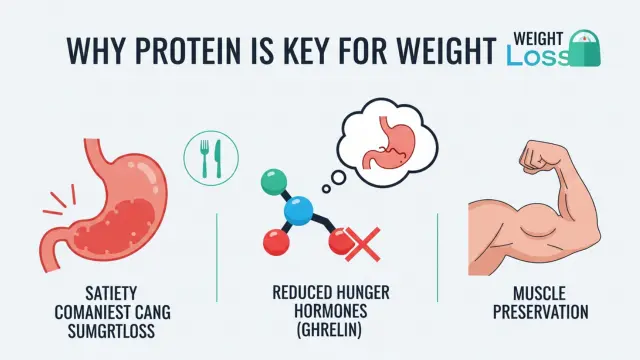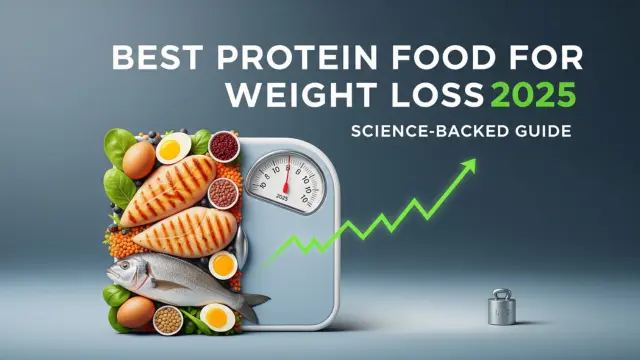Losing weight isn’t about eating less — it’s about eating smarter. One nutrient shows up in study after study when it comes to fat loss and long-term results: protein. If you’ve ever struggled with constant hunger on a diet or watched the scale drop only to feel weaker, protein may be the missing piece.
In this guide, we’ll cover the best protein food for weight loss, what science really says about them, and how you can use protein to burn fat without starving yourself.
Why Protein Is Key for Weight Loss
Most diets fail because they leave you feeling hungry, tired, or deprived. Protein changes that. Here’s why:
- It keeps you full longer. Protein slows digestion and stabilizes blood sugar, so fewer energy crashes and snack cravings.
- It curbs late-night eating. Research shows protein reduces ghrelin, the “hunger hormone”, while increasing satiety hormones like GLP-1 and PYY.
- It protects lean muscle. When you lose weight, your body can burn both fat and muscle. Protein helps preserve muscle, which keeps your metabolism higher.

👉 Think about it: if you’ve ever eaten a high-carb breakfast like toast or cereal, you probably felt hungry again within two hours. Compare that to eggs or Greek yogurt — you stay satisfied much longer. That’s the power of protein.
What Science Says: A 2015 review in The American Journal of Clinical Nutrition found that people who followed higher-protein diets reported more satiety and better fat loss than those on lower-protein diets.
The Science of Protein and Fat Loss
Most people think weight loss is just calories in versus calories out. That’s partly true, but the type of food you eat changes how your body handles those calories. Protein gives you an edge in three major ways.
1. Protein Burns More Calories During Digestion
When you eat, your body uses energy to break food down — this is called the Thermic Effect of Food (TEF).
- Protein has the highest TEF of all macronutrients: it burns 15–30% of its calories just through digestion.
- Compare that to carbs (5–10%) and fats (0–3%).
- Translation: eating protein literally raises your calorie burn without extra effort.
Scientific Study: A classic study published in the American Journal of Clinical Nutrition showed that protein increased energy expenditure significantly more than carbs or fat.
2. Protein Helps Control Hunger Hormones
Protein isn’t just about muscles — it affects hormones that decide when you feel full.
- Eating more protein lowers ghrelin (your hunger hormone).
- It also boosts GLP-1 and PYY, hormones that tell your brain you’re satisfied.
- That’s why a high-protein breakfast keeps you full until lunch, while sugary cereal leaves you raiding the fridge.
Study proof: A trial from the American Journal of Clinical Nutrition found participants who ate 30% of calories from protein reported less hunger and fewer late-night cravings.
3. Protein Protects Your Muscle While You Lose Fat
When you cut calories, you risk losing muscle along with fat. Muscle is precious — it keeps your metabolism strong and your body toned.
- Higher protein intake preserves lean muscle during calorie restriction.
- That means more fat loss, less “skinny-fat.”
- Pairing protein with resistance training makes this effect even stronger.
Study proof: A 2016 meta-analysis in Nutrition & Metabolism confirmed that people on high-protein diets lost more fat and less muscle than those eating less protein.
👉 In short: protein doesn’t just help you lose weight. It helps you lose the right kind of weight — body fat — while protecting your muscle and metabolism.
If your goal is faster weight loss, here’s something interesting we found. A new video reveals a simple ‘Red Wine Trick’ that may help support fat burning in a natural way. Many people are calling it a game-changer. 👉 [Watch the video here] to see how it works.
How Much Protein Do You Actually Need?
Here’s the tricky part: most people don’t eat enough protein when they’re trying to lose weight. The official Recommended Dietary Allowance (RDA) is 0.8 g per kilogram of body weight, but that’s just the bare minimum to prevent deficiency. It’s not enough if your goal is fat loss and muscle preservation.
Smarter Targets for Weight Loss
Research suggests that 1.2 to 2.0 grams per kilogram of body weight works best for weight loss while maintaining lean mass.
- For example, if you weigh 70 kg (154 lbs), that equals 85–140 g of protein per day.
- If you’re active or lifting weights, you should lean toward the higher end.
Why Not Just Eat More and More?
More protein doesn’t always mean better results. Your body has a limit to how much it can use effectively. Beyond that, extra protein may replace other vital nutrients, like fiber and healthy fats, that you also need for overall health.
According to nutrition experts at the Cleveland Clinic, a high-protein diet can absolutely support fat loss, but balance is the real key. Pairing protein with vegetables, whole grains, and healthy fats ensures you lose weight healthily.
Similarly, Harvard Health points out that protein needs vary by age, activity level, and health status. But for most adults aiming to lose weight, slightly higher protein than the RDA helps control hunger and protect muscle.
👉 A practical tip: spread your intake evenly across the day. Hitting 20–30 g of protein per meal is more effective for appetite control and muscle retention than loading it all at dinner.
Best Protein Foods for Weight Loss
Not all protein is created equal. Some foods have protein but also extra fat, sugar, or calories that can work against your goals. If you want to lose fat while staying healthy, these are the top protein foods you should be eating.
Eggs – The Breakfast Winner
Eggs are one of the most complete protein sources you can eat. They’re full of all 9 essential amino acids and filling. Studies show that eating eggs for breakfast can reduce calorie intake later in the day. According to one study, eggs are also loaded with micronutrients like vitamin D and choline, so they’re more than just a protein source.
Greek Yogurt – Creamy but Powerful
Greek yogurt has double the protein of regular yogurt. It’s also packed with probiotics for gut health. Choose plain, unsweetened, and you get protein without added sugar and can sweeten with fruit or honey.
Chicken Breast – Lean and Versatile
Skinless chicken breast is the go-to protein for weight loss. It’s lean, low in calories, and can be prepared in dozens of ways. The Mayo Clinic recommends poultry like chicken and turkey as great lean protein options for those focusing on fat loss.
Lentils – A Plant-Based Protein Superstar
Lentils prove that plants can compete with animal proteins. They’re high in fiber as well as protein, so they keep you full for hours. A cup of cooked lentils has 18g of protein and gut-friendly fiber.
Salmon – Protein + Healthy Fats
Salmon gives you high-quality protein and omega-3 fatty acids. These healthy fats reduce inflammation and may support fat metabolism. According to a study, fatty fish like salmon are great for those who want weight loss and heart health at the same time.
Comparison of Best Protein Foods for Weight Loss
| Food | Protein (per 100g) | Calories (per 100g) | Extra Benefit |
| Eggs | 13 g | 143 | Nutrient-dense, very filling |
| Greek Yogurt | 10 g | 59 | Probiotics for gut health |
| Chicken Breast | 31 g | 165 | Lean, versatile |
| Lentils (cooked) | 9 g | 116 | Fiber + plant protein |
| Salmon | 20 g | 206 | Omega-3 fatty acids |
The key is variety. By mixing both animal and plant-based proteins, you not only cover your protein needs but also get fiber, healthy fats, and essential micronutrients your body needs to thrive while losing weight.
Quick Pros & Cons of High-Protein Diets
Pros
- Keeps you full longer, reduces cravings.
- Helps protect lean muscle during weight loss.
- Slightly boosts calorie burn through digestion.
- Supports more stable blood sugar levels.
Cons
- Not ideal for people with kidney disease.
- It can crowd out other nutrient-rich foods if not balanced.
- May cause constipation without enough fiber and water.
👉 Bottom line: High-protein diets work best when balanced. Pair lean protein with vegetables, fruits, whole grains, and healthy fats to lose weight in a way that also supports long-term health.
Who Should (and Shouldn’t) Try a High-Protein Diet
High-protein diets aren’t one-size-fits-all. While many people benefit, some should approach it cautiously.
Who Should Try It
- Adults looking to lose fat: If your goal is fat loss without losing muscle, increasing protein helps preserve lean mass, according to Harvard Health.
- Those struggling with constant hunger: Protein keeps you full longer, which makes it easier to stick to a calorie deficit.
- Active individuals or weightlifters: Protein supports muscle recovery and growth, helping maintain strength during fat loss.
Who Should Be Cautious
- People with kidney disease: Excessive protein can strain the kidneys in those with pre-existing conditions, according to Mayo Clinic.
- Those with certain metabolic conditions: Individuals with gout or other protein-sensitive disorders should consult a doctor before drastically increasing protein.
- Pregnant or breastfeeding women: Protein needs are higher during these stages, but very high protein diets may displace other vital nutrients, so professional guidance is recommended.
Tip: Even if you’re in a “should try” category, balance is key. Combine protein with vegetables, whole grains and healthy fats to get a whole approach.
Final Verdict: Is a High-Protein Diet the Best Way to Lose Fat?
High-protein diets aren’t a magic pill, but they’re one of the best tools for sustainable fat loss when done right.
- Protein helps you feel full, control cravings, and maintain lean muscle while losing fat.
- Scientific studies and reputable health sources show moderate to high protein intake is better for fat loss than low protein diets.
- Balance is key. Pairing protein with fibre-rich vegetables, whole grains, and healthy fats is overall health while losing weight.
Success isn’t just about eating more protein — it’s about creating a sustainable eating pattern that fits your lifestyle. Start by gradually increasing protein at each meal, track how you feel, and adjust based on your activity level and hunger cues.
If you want controlled appetite, better body composition, and more fat loss, then focusing on the best protein for weight loss is worth a try.
FAQs
Q1: What’s the single best protein food for weight loss?
There isn’t a one-size-fits-all answer. Eggs, Greek yogurt, chicken breast, and lentils are all excellent choices. Variety is important to cover all nutrients.
Q2: Can I lose fat on protein without exercise?
Yes, increasing protein can help control hunger and reduce calorie intake, but pairing it with resistance training improves muscle preservation and metabolic rate.
Q3: Is plant protein as effective as animal protein?
Both can support fat loss. Plant proteins like lentils, tofu, and quinoa are slightly lower in some amino acids but are rich in fiber and micronutrients, making them an excellent choice when combined.
Q4: How long before results show?
Individual results vary, but many people notice reduced hunger and small changes in weight within 2–4 weeks when consistently increasing protein intake while maintaining a balanced diet.


Recent Posts